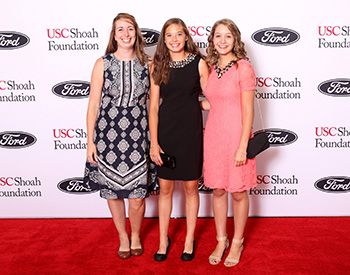IWitness Video Challenge 2016: Advice from Last Year’s Winners
Every other week until the submission deadline May 13, 2016, USC Shoah Foundation will share insight about the IWitness Video Challenge.

Now, the three want to help other students and educators who are currently working on projects for this year’s contest.
Read on for Emma, Natalia and Lisa’s advice for getting inspired, constructing a memorable video and making a real difference in your community.
For Educators: Getting Your Students Involved
- I have found that coupling the idea of an outside-of-school project with argument writing in the classroom gives the kids a chance to think about what they care about. When you tell them that you plan on teaching them to argue efficiently to "get what they want," they are engaged. – Lisa Farese
- I offered my students a chance to try something "amazing, that would push past the walls of this classroom. If you are interested, see me ASAP." I left it at that, and within 5-10 days (including weekends) kids were signing up. – Lisa
- Simply put, be [your students’] sounding board. There will be many ideas before the right one is chosen, and sometimes all students need is to discuss them. – Natalia Podstawka
- It is helpful to be there, and explain the structure of the IWitness site if possible. It is important for the students to know how to navigate the website, and find the testimonies. – Natalia
Choosing Your Project
- The testimonies in the archive were helpful when coming up with ideas. I learned more about the Holocaust which gave me more background information for the project. – Emma Heintz
- Your first idea will not be your best. Keep thinking, keep looking online. Watch testimonies before you decide on a final project. It can be stressful to have an idea, but not a testimony that fits perfectly, so try to avoid that. Watch videos from previous years, jot down issues in your community, and don’t be afraid to think big. Sometimes the risky or scary idea can be the best. – Natalia
- Think of your peers, the well-being of your school and your community. Do what you think will make someone's day better. – Emma
- No idea is bad no matter how big or how small. – Emma
Making Your Video
- Plan your time wisely! Even if a few months seems like plenty of time, things will stock up- and you will have to balance your own schedule and this project. Do not underestimate the time that will be needed, just even before you start your real project. Often, you will need to plan exactly what you will do, discuss with your teacher, and perhaps even receive permission. – Natalia
- Work with your teacher as much as you can. Meet regularly with them, because they will be your sounding board. Discuss your ideas, plans, and how you will attempt them. – Natalia
- Make sure you leave time for your editing and creating of the video portion. Fancy equipment and editing programs are not needed. Simplicity is key, and just remember: you are trying to convey a message to your “audience.” Better to use a few powerful words than many meaningless ones. - Natalia
- Add little pieces of yourself through the project, it is nice to see a little about the creator through their work. - Natalia
Having an Impact
- Overall I would think of your community and not of any prize but the impact on your community. - Emma
- Never forget the ultimate purpose, to help your community. However, do not stress yourself out over finding the “perfect” idea. You may not believe you have the most perfect plan, but always try. You will always think you can do better, but sometimes, real potential lies in the “underdog” idea. – Natalia
- Have the most amazing time, and use the IWitness website to the fullest. It is a beautiful resource that has information that could be very helpful. – Natalia
- As a teacher I just have to remember that anything I may visualize will be nothing compared to the brain and heart of a 13-14 year old. They see the world from such a different place. – Lisa
- I think with last year's project the success came from the desire to affect a day/experience in our school. Although we were grateful and felt blessed to win, the girls really focused on the impact and not the prize. – Lisa